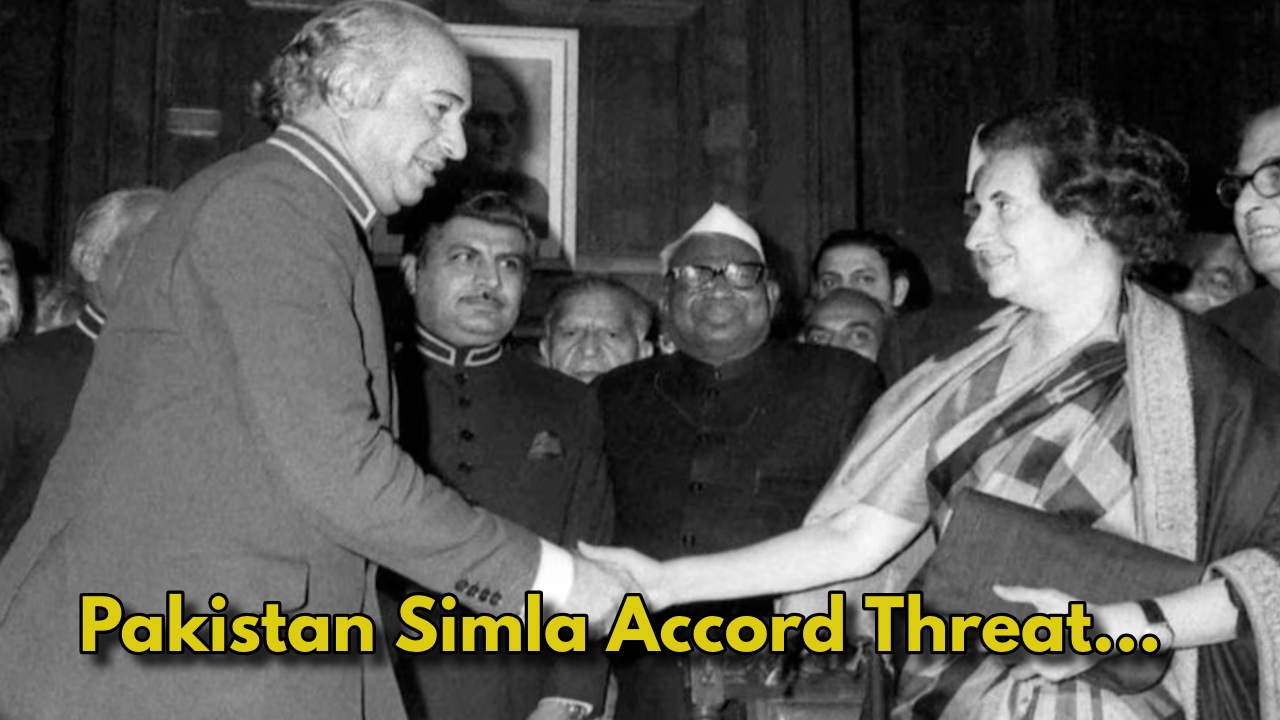Pakistan Threatens to Scrap Simla Accord: Recently, Pakistan has threatened India, after which the Shimla Agreement of 1972 has again come into the limelight. This agreement was made to maintain peace after the 1971 war between India and Pakistan. But the real question is, what is this Shimla Agreement? What is its importance? How much value remains in today’s time, and can Pakistan truly cancel it? Let’s understand in simple language.
After the terrorist attack in the Baisaran Valley of Pahalgam in Jammu and Kashmir, the Indian government has taken strict steps against Pakistan. In response to this, Pakistan is also retaliating one after the other. It has closed the Wagah border, stopped the SAARC visa facility, and also closed its airspace for Indian planes.
Pakistan’s Prime Minister Shahbaz Sharif had suddenly called a meeting of the National Security Committee (NSC). Pakistan made many decisions in this meeting. Pakistan accused India of violating international law and United Nations resolutions and even threatened to cancel the Shimla Agreement. Pakistan also stated that it reserves the right to terminate all bilateral agreements with India, including the Shimla Agreement.
Following this threat from Pakistan, the Shimla Agreement is once again being discussed. This agreement was signed in 1972 to bring peace after a big war between India and Pakistan. But the main thing is, what is this agreement? What is its importance? What value does it hold today, and can Pakistan truly end it? Let’s understand it in simple language.
There was a war between India and Pakistan in 1971, which was about liberating East Pakistan (today’s Bangladesh). The Pakistani Army committed a lot of atrocities in East Pakistan, due to which millions of people came to India to take refuge. In response to this, India intervened and started military action against Pakistan.
This war ended with a massive victory for India. About 93,000 Pakistani soldiers surrendered to the Indian Army, and a new country – Bangladesh came on the world map.
India was in a position to impose its own terms on Pakistan. Instead, it considered peace and stability as its top priorities, initiated talks with Pakistan, and the Shimla Agreement was subsequently signed.
Shimla Agreement: When, where and between whom was it signed?
The Shimla Agreement was signed on July 2, 1972, in the city of Shimla, India. Then-Prime Minister Indira Gandhi signed this agreement on behalf of India, and then-President Zulfikar Ali Bhutto signed on behalf of Pakistan. This agreement was not only to rectify the situation following the 1971 war, but also a significant step towards improving future relations and maintaining peace.
Main terms and points of the Shimla Agreement
Many important points were agreed upon in the Shimla Agreement, some of the important ones are:
Bilateralism: India and Pakistan agreed to resolve all their disputes through mutual dialogue. That means no third party, such as the United Nations, the United States, or any other external power, will intervene.
This was a significant diplomatic victory for India because Pakistan repeatedly tried to raise the Kashmir issue at the international level.
There will be no fighting: Both countries have promised not to resort to violence or military force against each other and to resolve all issues peacefully.
The Line of Control was redefined: A new Line of Control was established in the aftermath of the 1971 war, which was subsequently accepted by both countries. This is the same Line of Control that remains the border between India and Pakistan.
Return of prisoners of war and occupied land: India released about 93,000 Pakistani prisoners of war without any conditions. Additionally, most of the land that India had captured during the war was also returned to Pakistan.
Importance of the Shimla Agreement: India’s diplomatic victory
Through the Shimla Agreement, India recognised Kashmir as a bilateral issue. This means that Pakistan can no longer expect mediation from the United Nations or any third country.
On one hand, there was Pakistan’s defeat and surrender of soldiers, on the other hand, there was India’s sensible and peace-loving attitude. This improved India’s image at the international level.
Kashmir and Shimla Agreement
The most significant impact of the Shimla Agreement was on the issue of Kashmir. Pakistan often attempts to address this issue through international forums, but the Shimla Agreement restricts it to bilateral talks. India uses it as a legal basis that Kashmir is not a global issue.
In 1948, the United Nations Security Council passed a resolution on Kashmir, which called for a referendum. However, in 1972, under the Shimla Agreement, Pakistan downplayed the significance of these resolutions by agreeing to hold mutual talks. This is the reason why India refuses United Nations interference.
After the terrorist attack in Pahalgam in 2025, India started increasing diplomatic pressure on Pakistan. In response, Pakistan, citing the Shimla Agreement, said that it is ‘stopping’ all bilateral agreements with India until India accepts the “resolutions of the United Nations” and “international law”.
But can Pakistan do this? Technically, any country can withdraw from an agreement, but doing so has a profoundly negative impact on its international reputation. If Pakistan rejects the Shimla Agreement, it will also accept that there is now no chance of resolving the Kashmir issue through talks. In this situation, India can clearly state that if Pakistan cancels the agreement, then it will also not be bound by any consequences.
If Pakistan cancels the Shimla Agreement, it can completely halt the mutual dialogue, and tension can escalate further at the international level. Additionally, it is the responsibility of both countries to respect the Line of Control (LOC as outlined in the Shimla Agreement. If this agreement is breached, the armies of both countries may become more aggressive along the Line of Control (LOC), and the risk of war can increase. Additionally, there may be a lack of trust in matters related to prisoners of war or future wars.


